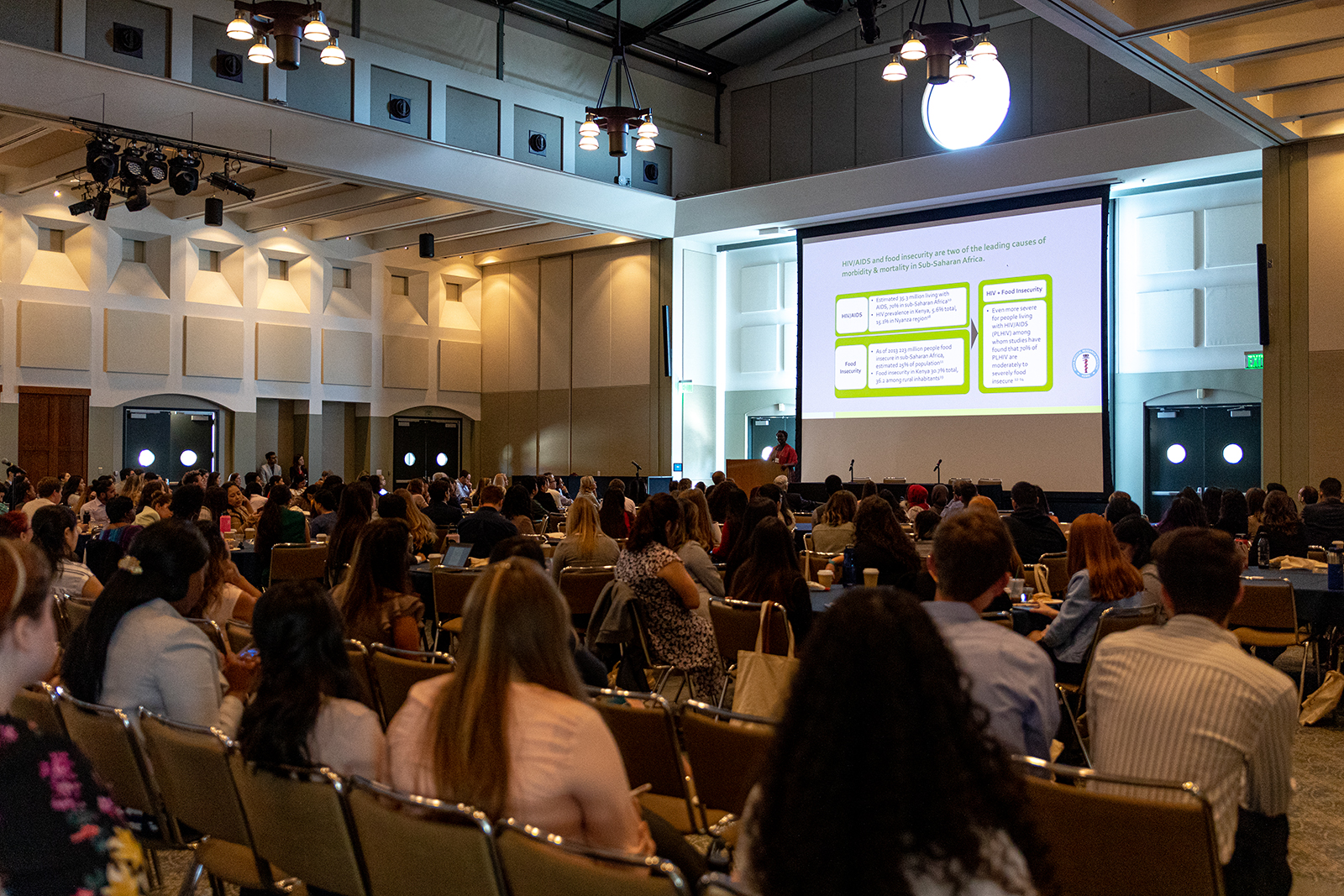UCLA students advocate for global community in health care conference

The Los Angeles Global Health Conference hosted Saturday in Covel Commons highlighted urgent international crises. The event also featured research from UCLA students. (Ashley Kenney/Daily Bruin)

By Sarah Nelson
Feb. 4, 2020 12:08 a.m.
Leaders in the health industry parsed out policies side by side with members of the UCLA community during a health conference Saturday.
The conference consisted of four major topics and 21 speakers. Lecturers discussed global health crises, migrant and refugee health, emerging global health technology and health care equity.
UCLA medical students Sophia Taleghani and Marissa Holden said that accessible, emergent health care such as point-of-care transportable ultrasound, is necessary for the diagnosis of patients in areas with limited resources such as Haiti.
The unifying theme throughout the speakers’ presentations was humility and transparency in bridging the divide between underrepresented communities and health care initiatives.
Former UNICEF health specialist and UCLA global health professor Maryam Farzanegan addressed the need for giving value and dignity to the individual in health care.
“Health care is a human right. Building local capacity is the key,” Farzanegan said.
Focusing on children caught in armed conflicts and natural disasters, Farzanegan made an urgent request on behalf of youth caught in crises such as those involved in the civil war in Sudan and child soldiers in Sierra Leone.
“I am here to give you a small window into the lives of these exploited children,” Farzanegan said.
Farzanegan said she realized that during her time in UNICEF, children will only find normalcy through education, which requires global entities to invest in local populations.
Farzanegan also served as the principal investigator for one of the undergraduate research poster boards, which presented research on opioid abuse in India.
This student poster was a collaboration by Priya Dahiya, a fourth-year psychology and global health student, and Harseerat Jajj, an alumna who graduated in fall 2019 with a degree in neuroscience and global health.
Their research compared opioid dependence in India to addiction in other global communities. They highlighted the shortcomings in India’s public health policy and made recommendations for overcoming the issue.
The researchers also contrasted India’s public health policy with Nigeria’s. While Nigeria stresses family education about substance abuse and addiction, India critically lacks it, they said.
India’s location near Afghanistan and China makes it additionally vulnerable to substance abuse, Dahiya said, as both China and Afghanistan have issues with opioids.
India’s lack of mental health advocacy was further discussed in a breakout speech by Rupa Patel, an assistant professor of medicine in the division of infectious diseases at the Washington University School of Medicine in St. Louis.
Patel works as a member of the Physicians for Human Rights Asylum Network and with Rohingya refugees in Bangladesh.
Patel used her resources at the Washington University School of Medicine in St. Louis to translate forensic documents from English to Bangla in order to more easily promote and advocate for the mental health of refugees who were exploited and sexually abused. Patel said mental afflictions are the No. 1 global burden disease.
Another student presentation that focused on marginalization was “Blind Spots in Care: Demarginalizing the Intersections of Culture and Campus Sexual Assault at UCLA.” The presentation addressed the issue of on-campus sexual assault as targeting students of color, members of the LGBTQ+ student body and transfer students.
The research was presented by fourth-year world arts and cultures student Aaliyah Sade, research assistant and alumna Estrella Ulloa-Flores and research associate at the UCLA Global Center for Children and Families Stephanie Sumstine.
Their reportage took into account the institutional and interpersonal ramifications of reporting assault, highlighting desensitization among members of the campus and policing communities in terms of dealing with nonwhite nonathletes.
“There is so much literature on sexual assault on campus, but none of it mentions the students who are experiencing it the most,” Sade said.
Another poster, presented by second-year human biology and society students Sapna Ramappa and Devika Shenoy, highlighted ethics and accountability in biomedical research publications.
Change will only be implemented by the student body, said UCLA professor and University of California Global Health Institute Director Thomas Coates.
“Thank yourselves for being here, for caring, for wanting to learn,” Coates said. “You’ve got a great future ahead of you and much to do. And we’re looking forward to you taking over and carrying the torch.”

